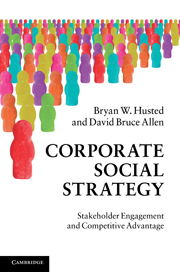Book contents
- Frontmatter
- Contents
- Figures
- Tables
- Acknowledgments
- 1 Introduction
- Part I Fundamentals
- Part II The process of developing corporate social strategy
- 6 Competitive environment
- 7 From stakeholder management to social strategy
- 8 Resources and capabilities
- 9 Organizational identity
- Part III Implementing social strategy
- Bibliography
- Index
9 - Organizational identity
Published online by Cambridge University Press: 05 June 2012
- Frontmatter
- Contents
- Figures
- Tables
- Acknowledgments
- 1 Introduction
- Part I Fundamentals
- Part II The process of developing corporate social strategy
- 6 Competitive environment
- 7 From stakeholder management to social strategy
- 8 Resources and capabilities
- 9 Organizational identity
- Part III Implementing social strategy
- Bibliography
- Index
Summary
Introduction
We began our discussion of corporate identity as an integral element of corporate culture back in Chapter 4, as we set out the step-by-step model for social strategy formulation and implementation. Step 3, you may recall, is “Evaluate firm identity.”
In Chapter 4, we dodged the multiple issues of defining a workable concept of culture, which we must try to make amends for here. While management unflinchingly invokes culture as the reason for doing things in a certain way, and “our culture” is often said to explain what makes the company what it is, culture is a highly contested concept in academics. First, the concept is properly in the domain of anthropology – in fact, so central to the field that it is often simply called cultural anthropology, and so divisive that anthropology habitually engages in definitional turf wars over the term (Geertz, 1973). Cultural anthropology, like its sister science, sociology, has a habit of bumping into psychology and borrows much of its terminology from early twentieth-century work in personality psychology in areas such as identity and values. The concepts of culture, identity, and values are dragged into management research and applied to organizations with questionable results. To be fair to the management field, and the social sciences in general, these concepts are difficult, highly abstract, yet fundamental to all human behavior.
- Type
- Chapter
- Information
- Corporate Social StrategyStakeholder Engagement and Competitive Advantage, pp. 183 - 210Publisher: Cambridge University PressPrint publication year: 2010



